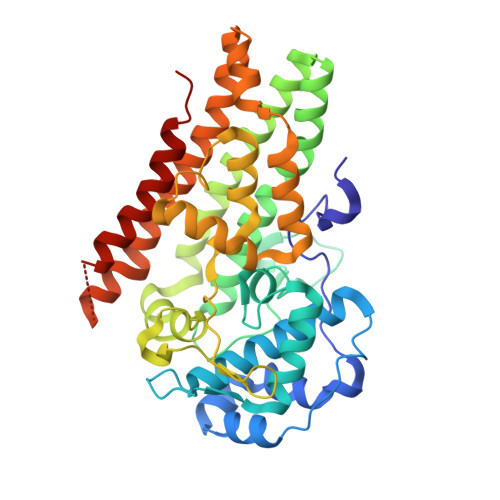Discovery of Amino-cyclobutarene-derived Indoleamine-2,3-dioxygenase 1 (IDO1) Inhibitors for Cancer Immunotherapy.
Zhang, H., Liu, K., Pu, Q., Achab, A., Ardolino, M.J., Cheng, M., Deng, Y., Doty, A.C., Ferguson, H., Fradera, X., Knemeyer, I., Kurukulasuriya, R., Lam, Y.H., Lesburg, C.A., Martinot, T.A., McGowan, M.A., Miller, J.R., Otte, K., Biju, P.J., Sciammetta, N., Solban, N., Yu, W., Zhou, H., Wang, X., Bennett, D.J., Han, Y.(2019) ACS Med Chem Lett 10: 1530-1536
- PubMed: 31749906
- DOI: https://doi.org/10.1021/acsmedchemlett.9b00344
- Primary Citation of Related Structures:
6PU7 - PubMed Abstract:
Checkpoint inhibitors have demonstrated unprecedented efficacy and are evolving to become standard of care for certain types of cancers. However, low overall response rates often hamper the broad utility and potential of these breakthrough therapies. Combination therapy strategies are currently under intensive investigation in the clinic, including the combination of PD-1/PD-L1 agents with IDO1 inhibitors. Here, we report the discovery of a class of IDO1 heme-binding inhibitors featuring a unique amino-cyclobutarene motif, which was discovered through SBDD from a known and weakly active inhibitor. Subsequent optimization efforts focused on improving metabolic stability and were greatly accelerated by utilizing a robust S N Ar reaction of a facile nitro-furazan intermediate to quickly explore different polar side chains. As a culmination of these efforts, compound 16 was identified and demonstrated a favorable overall profile with superior potency and selectivity. Extensive studies confirmed the chemical stability and drug-like properties of compound 16 , rendering it a potential drug candidate.
Organizational Affiliation:
Departments of Discovery Chemistry, Discovery Process Chemistry, In Vitro & In Vivo Pharmacology, Discovery Pharmaceutical Sciences, Computational and Structural Chemistry, and Pharmacokinetics, Pharmacodynamics and Drug Metabolism, Merck & Co., Inc., 33 Avenue Louis Pasteur, Boston, Massachusetts 02115, United States.
















